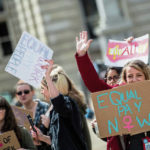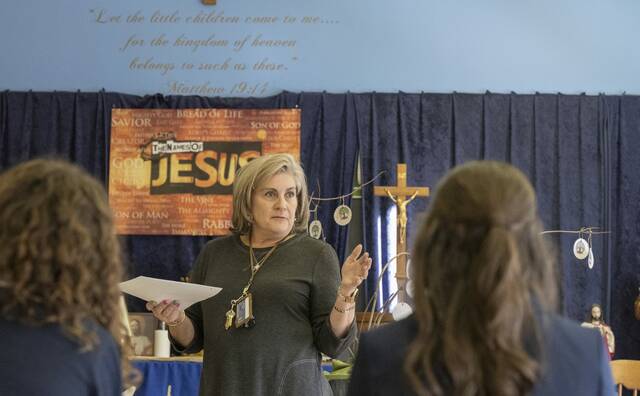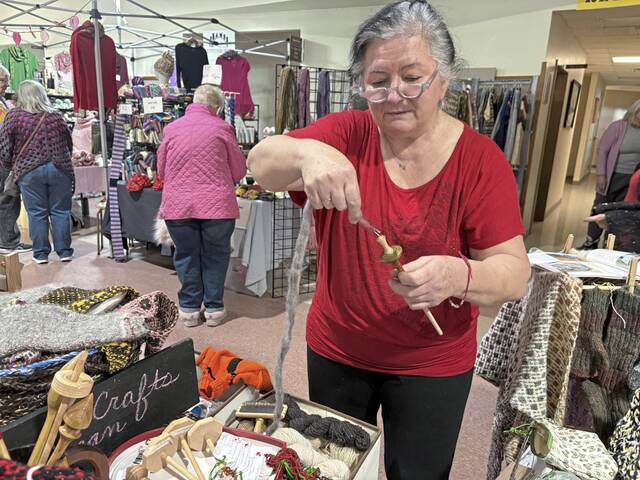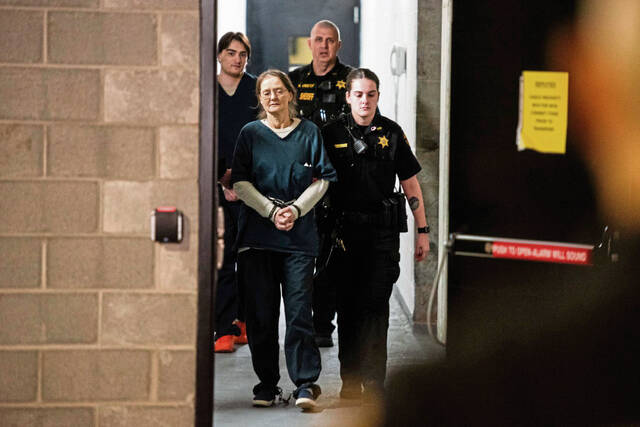Aryanna Berringer never dreamed she’d have to go to war to find a workplace where equal work meant equal pay.
But looking back, the 36-year-old businesswoman, author and social activist said that’s exactly what happened.
Speaking at Tuesday at Seton Hill University’s annual Equal Pay Day Rally at Courthouse Square in Greensburg, the Murrysville mother of two, who enlisted in the Army two months after 9/11, recalled how she deployed to the Middle East during the invasion of Iraq during her four-year enlistment.
“In the military, I could pull up what I was making and what anybody else with the same experience was making. It was all the same,” Berringer said. “Who knew the military could be the proving ground for equal pay? Women shouldn’t have to go to war for equal pay.”
It’s a different world in the private sector — and one Berringer would like to see change before her young daughters grow up, she added, as the Seton Hill marchers cheered and motorists honked encouragement.
Every year since 1996, groups across the country have held Equal Pay Day observances to mark how far into the next year the average woman must work to collect the same pay the average man earned the prior year.
President Kennedy in 1963 signed the Equal Pay Act, which required women be paid the same as men for equal work. At that time, women earned 63 cents for every dollar earned by men.
U.S. women on average now earn 80.5 cents for every dollar earned by men, recent figures from the U.S. Census indicate.
Some experts dispute such figures, arguing that women tend to gravitate toward lower paying occupations and interrupt careers for family obligations.
Sometimes they start out behind, said Debra Mason, Seton Hill’s Chief Diversity Officer and Director of the Wukich Center for Entrepreneurial Opportunities. Mason told about two dozen rally participants how she learned in her first job that she was paid $4,000 to $5,000 a year less than a male colleague with similar credentials.
“It’s just not fair,” she said.
Employer policies prohibiting the disclosure of pay rates simply allow such policies to continue, Mason said.
“They’re hiding the truth,” she said. “What we really need is for our companies to be fair, to do their due diligence and up the pay scale for women.”
Waving hand-lettered placards, students, members of the university’s Feminist Collective and Griffins for Human Rights applauded her suggestions.
In Harrisburg, Gov. Tom Wolf marked Equal Pay Day and called on Congress to pass the Paycheck Protection Law. Advocates say the law that passed the House would improve workplace protections for women by barring employers from seeking salary histories on job applications and strike down policies that prohibit employees from disclosing their pay to others.
Advocates say both practices work against women.
Last year, Wolf signed an executive order barring state agencies from requiring a salary history on job applications, and he continued to urge the General Assembly to pass legislation covering all working women.
“Businesses, families, workers and our economy benefit when all employees are paid fairly, regardless of their gender,” Wolf said. “Women have waited far too long for paycheck fairness.”















